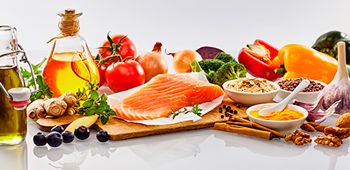
Having food cravings at night and giving in to them is one of many guilty pleasures people can endure. The simple thought of a snack or food lingers in our mind, the anticipation of satiety weakening our will… until we find ourselves in front of the fridge, unable to stop. Many people deal with strong food cravings during different periods of their lives. It’s not something that only happens during pregnancy nor only among certain type of people. As a matter of fact, it can happen to anyone, and that is ok, if it happens with little frequency or only on a few occasions. Having frequent or regular food cravings at night might be linked to some eating disorders such as binge eating disorder, compulsive overeating, night eating syndrome, bulimia nervosa, anorexia nervosa, and obesity [1].
Food cravings
Food cravings are an intense desire to consume a specific food that is difficult to resist [1]. It’s not necessarily a problem or a symptom of a condition, unless its frequency and the food intake it causes leads to other health consequences, like obesity. Most people do experience food cravings and give into them, no matter their age or physique.
There are some differences between certain types of population, though. For instance, it has been reported that women tend to feel more cravings than men. According to a recent study, female patients have a higher anticipation of relief of negative states and feelings from eating, intentions and plans to consume food, cravings as hunger, lack of control over eating, more emotions experienced before or during food cravings or eating, and guilt from cravings or giving into them than men [1].
However, one study noted that bariatric candidates experienced stronger, more intense cravings which were more often triggered by their environment, were more likely to plan to consume craved foods, more often sought and anticipated relief from negative feelings by eating, felt more guilt as a result of having and giving into cravings, believed they had less control over their eating and were more preoccupied with food [2].
Some triggers of food cravings include:
- Stress and anxiety. People usually increase their food intake during stressful periods. When stress becomes chronic and overeating is recurrently used as an effective coping strategy, neurobiological adaptations become stable and promote the compulsive nature of overeating [1].
- Hunger, nutritional or caloric deficits. When we neglect having a specific schedule, routine or plan for our daily meals, we risk either skipping meals or enduring long periods without having any food. What this does is that it stresses our body by depriving it of nutrients and sustenance, which triggers urgent hunger and cravings. This in turn can lead to impulsive eating, overeating or engulfing food that’s within reach.
- Menstrual-related changes. Some studies have showed that food intake in women is higher, and their cravings more intense and frequent, during their menstrual phases [1].
- Negative mood states. Suffering from depression, having a negative mood, or feeling anxious is highly linked with emotional eating. In these cases, eating is used as a coping mechanism in the belief that it can make us feel better. However, overeating in these conditions usually leads to a sense of guilt and remorse.
- Expectations derived from olfactory and visual imagery. Cravings are usually attributed to spontaneous thoughts that involve visualizing or imagining food and the satiety it would provide. According to a study, visualizing and imagining the taste of food are highly correlated with vividness of the imagery and craving intensity [3]. So thinking about food and falling into suggestion motivate our cravings and stimulates our impulses.
Having food cravings is not considered pathological, although it might lead to various negative effects, like overweight or obesity.
Night Eating Syndrome vs Food cravings
However, there is a condition directly related with compulsive eating at night. The night eating syndrome (NES) is a condition where someone has recurrent episodes of night eating, either after waking from sleep during the night or excessive food consumption after dinner. A person who suffers from night eating syndrome recognizes that he or she is overeating, but can’t help it and later deals with distress or guilt [4]. This syndrome was included for the first time in the DSM-5. Among the general population, its prevalence is of 1.5%, but studies have found that its prevalence is much higher among bariatric surgery candidates, ranging from 1.9 to 41.7% [4]. So, how do we distinguish simple food cravings from the night eating syndrome? The night eating syndrome is characterized by:
- Consumption of more than 25% of daily food intake after the evening meal, in the evening or night-time, at least twice a week.
- Plus at least three of the following symptoms:
- Lack of desire to eat in the morning more than 4 times per week
- The strong urge to eat between dinner and sleep onset or during the night
- Insomnia more than 4 nights per week
- The belief that eating makes sleeping easier
- These symptoms must be present for at least three months [4].
These are guidelines to detect if there’s a strong reason to worry. Further assessment would be necessary to determine if someone is experiencing night eating syndrome.
How to prevent food cravings at night
In what follows, we will list 10 recommendations about how you can prevent food cravings, specially at night.
- Plan your meals.
You can either have a weekly menu or a meal plan so you can buy the ingredients you need and dedicate proper time for preparing and consuming your meals. Planning your meals accordingly can prevent you from snacking and overeating.
- Stick to a balanced diet, with enough protein.
Make sure your meal plan includes food from all major food groups. Also, including protein in every meal is a great way to feel satiated for longer periods of time and avoiding cravings.
- Don’t skip any of your meals.
Make sure you take 3 medium to small sized meals and 2 to 3 small snacks during the day, every day. Don’t skip any of your meals, because depriving yourself of food could trigger cravings and lead you to impulsive eating.
- Set a fixed schedule for every meal.
Having a routine or a fixed eating schedule will prevent you from skipping any of your meals and will set your mind and body’s expectations toward food in a healthier way. Following this schedule on a regular basis will help your body and stomach to get used to a constant food intake, and this in turn will reduce your chances of suffering from cravings.
- Drink enough water.
Drinking a glass or water instead of a snack can delay your hunger for a little longer so you can make it until your next meal. Drinking water during the night can also help you feel a little fuller, giving you the strength needed to avoid night-time snacks.
- Stock your pantry with healthy snacks.
Have your pantry and fridge with accessible and easy to eat healthy snacks. For instance, you can wash and cut fruits and vegetables and store them in a way so it’s easy for you to reach and eat when you’re feeling hungry. If at a certain time you can’t fight against a craving, at least you can make smarter decisions on what to snack.
- Make it harder for you to give into temptations.
Avoid buying snacks, desserts or junk food that are high on fats and sugars. If you don’t have these around the house, it will make it harder for you to obtain when you’re feeling hungry or anxious about eating.
- Close your kitchen or find a way to keep it off range during your nights.
You can set a time at night where your kitchen and pantry need to be considered as off limits. Make yourself the habit of keeping away from the kitchen at night. You can either take a small and healthy snack with you and a big glass of water so you are not tempted to head back to the kitchen.
- Distract yourself and think of something else than food.
Sometimes we get food cravings because we get fixed on an idea or thought about a specific dish, snack or dessert. In these occasions, most of those cravings can be overcome when we just think about something else and forget about it. The craving is in itself created by our imagination and reward expectation, but not by our own body demanding it. It’s more of a psychologic fixation than a body demand, in this sense. When this happens, try to distract yourself by either getting busy or doing something else. You’ll notice that when you focus on something else entirely, the craving either diminishes or completely disappears.
- Take care of yourself.
Stress, anxiety and fatigue are triggers for unhealthy eating habits and for overeating. Nowadays is pretty easy to fall into a state of constant stress and anxiety due to our school, work, family… you name it. This is why is very important to take care of yourself and to focus on your own wellbeing.
First, try changing things that are in your control. Make your environment an inviting place for relaxation and mindfulness by avoiding stressors such as undesired noises or clutter, for instance. Avoid unnecessary activities or interactions that get you down, if possible. Second, place yourself as your own priority. Dedicate 10 to 30 minutes of each day to your yourself, where you can do meditation, yoga, exercise or your own favorite activity. These can be little changes that could take a big load off of you and get you in a better and healthier mindset.
Contact us
At LIMARP International Center of Excellence for obesity, at Tijuana, Mexico, we offer integral weight loss programs that adapt to every patient’s needs. If you’re interested in knowing more about how to avoid food cravings at night or about your candidacy for any bariatric treatment, contact us today to schedule a consultation. Our team of experts will be glad to help.
References
[1] C. Imperatori et al., “Gender differences in food craving among overweight and obese patients attending low energy diet therapy: a matched case–control study,” Eat. Weight Disord. – Stud. Anorex. Bulim. Obes., vol. 18, no. 3, pp. 297–303, Sep. 2013, doi: 10.1007/s40519-013-0054-7.
[2] V. Abilés et al., “Psychological characteristics of morbidly obese candidates for bariatric surgery,” Obes. Surg., vol. 20, no. 2, pp. 161–167, Feb. 2010, doi: 10.1007/s11695-008-9726-1.
[3] M. Tiggemann and E. Kemps, “The phenomenology of food cravings: The role of mental imagery,” Appetite, vol. 45, no. 3, pp. 305–313, Dec. 2005, doi: 10.1016/j.appet.2005.06.004.


